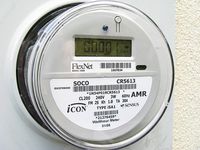Utility companies are a lot like the Bells.
They know what they do, or think they do. Their customers give them “intravenous” permission to sell them electricity, in the parlance of Seth Godin's “Permission Marketing.” Their monopolies are all regulated, and they chafe under it.
While secretly harboring the desire to be competitive forces, they're secretly comfortable, like the chartered accountant who thought he wanted to be a lion tamer until he found out what lions looked like.
Because they are big, because they act as gatekeepers, it's easy to think that utilities will drive the renewable energy business. Some very smart people, like Jesse Berst, have re-arranged their careers around this assumption.
But history tells me they will be laggards, not leaders. They need to be handed big, scaled opportunities, with pre-marked standards, and a sense of urgency based on consumer demand and competition before they will move decisively.

It's not that at all. It's an entirely new way of thinking of the grid – less client-server, more peer-to-peer. A smart meter is like a low-power client controlled by the utility, it's like they're sticking your terminal in your home so they can watch what you do. No wonder we're starting to see consumer opposition to them.
They're all about the utilities, not about the consumer at all. And the backlash is picking up steam, with a bill offered to let consumers “just say no” to smart meters in California.
It's not much of a headwind, but utilities don't like any headwind. If the gain for them isn't worth the hassle (and gains for them are measured in gigawatts and billions of dollars, not kilowatts and thousands) the chilling effect is bound to be profound.
I think that's fine. Rather than railing against any reality – whether in utility board rooms or in political capitals – history tells me the right path is to innovate around the block. And we can innovate around this one.
I'm pleased that the supply industry is coming around to this view. The launch of the Smart Grid Consumer Collaborative is a great example. The site looks like a bunch of NIMBY whingers, but it's really sponsored by big suppliers like IBM, GE and Control4.
One thing I hope these vendors work on hard are standards that point the way toward a truly smart grid. Given that the group is headed by Berst, I think that's very possible. So color me hopeful.











thanks for this wonderful post, it’s really interesting.. yeah, I also hope that these vendors work hard and do their best to offer everyone a smart grid.
thanks for this wonderful post, it’s really interesting.. yeah, I also hope that these vendors work hard and do their best to offer everyone a smart grid.